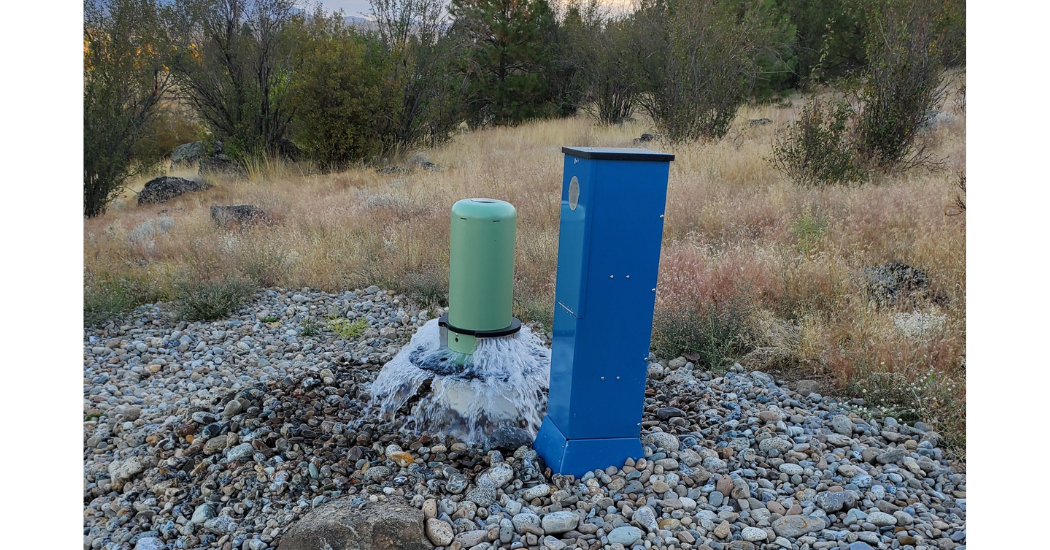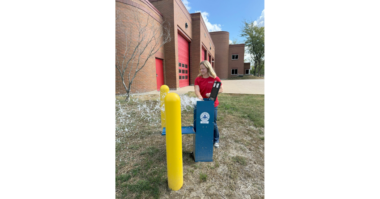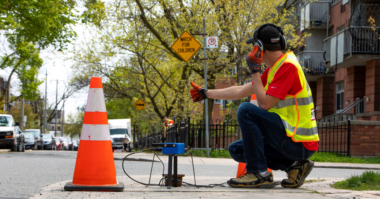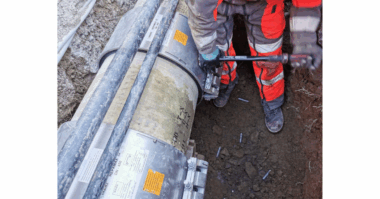Liberty Lake Sewer and Water District (LLSWD) is nestled in the mountains, east of the Spokane Valley and 3 miles west of the Idaho border. It is known for an abundance of pristine water from one of America’s largest aquifers, the Spokane Valley-Rathdrum Prairie Aquifer. With a population of 10,500 residents, the LLSWD has been enjoying this natural water, chlorine-free, without a trace of bacteria for 45 years – until they received a call from a new resident just before Thanksgiving.
LLSWD added 1,500 feet of water main to service two existing houses east of town. One of these new homeowners had a rare medical condition that made her extremely susceptible to mold and bacteria, so she ran a series of her own water tests that detected E. coli in her water. LLSWD has a laboratory that monitors water quality through the system by taking 20 to 30 samples a month to ensure bacteria does not enter the system. “Finding E. coli is a serious concern, and something we had to jump on right away,” said Mike “Andre” West, Chief Operator at Liberty Lake Sewer & Water District. “With further testing, we implemented a series of daily flushing and chlorinating efforts and had a boil water advisory in effect for 7 days that had people on edge for the upcoming Thanksgiving festivities.”
LLSWD was able to identify three dead end lines that were not adequately being flushed through daily use; giving rise to E. coli following fall sprinkler blow out activities – one being on route to the new residential service. Liberty Lake is one of the few public water systems in the region, and for that matter the country, that does not chlorinate. The water comes directly from the underground aquifer and is delivered directly to consumers with no extra additive treatments like fluoride or chlorine. “Discovering the E. coli was a huge hit for us; it affected our morale. We pride ourselves on the purity of our water so we needed to resolve the situation as quickly as possible so our residents could go back to enjoying the water they were accustomed to,” said West. The alternative solution was enforced chlorination by the Washington Department of Health that administers the Safe Water Drinking Act.
LLSWD installed three custom-engineered Hydro-Guard® 100 Series automatic flushing systems with water quality sampling stations from Mueller Water Products. The installation of the units took one day using three LLSWD field personnel. Once installed, LLSWD was able to immediately program automatic flushing of the connected water mains to ensure fresh water was flushing the dead-end lines weekly. The Hydro-Guard system can flush over 110 PSI, and the water is discharged to the atmosphere through a vented shield preventing erosion.
Each unit has an integrated programmer module that can be accessed by smartphone via Bluetooth. “I love the fact that I can just drive up with my phone and pull up the app to set the programmer,” said West.
All sorts of debris can slip into the water system, “One time we got a rock that jammed up in the globe control valve that can handle sand and other debris up to 5/8”. We had to disassemble the Hydro-Guard, retrieve the rock and put it all back together. It’s really easy to access the inner workings of the Hydro-Guard and does not take long to get in and out,” said West. If the debris problem persisted, a permanent solution would be the addition of a Singer® strainer upstream from the Hydro-Guard units.
The sampling stations are tapped into the service piping no more than 18” from the utility’s 100 Series flushing systems. This positioning is essential to allow for a sample to be an accurate representation of the utility’s water quality at the point of entry into the flushing device.
“During the E. coli event, we ran over 240 samples throughout our entire District to ensure that we did not have any more issues. The requirement is five clean samples over two consecutive days, so we went well above and beyond to assure ourselves and residents that the system was now clean,” said West. LLSWD got the “all-clear” from the Department of Health the day before Thanksgiving, meaning that all the residents could celebrate and give thanks to LLSWD staff for working so hard to restore the purity of their drinking water.
With so many outdoor recreation opportunities, Liberty Lake Sewer and Water District’s population is growing, and new developments are going up continuously as people seek a better lifestyle and move away from the big cities. Housing developments can be a bacteria “hot spot” for underutilized water systems as the infrastructure is designed for maximum flow capacity, but it takes time for houses to be sold and occupants to move in. With this experience, LLSWD water operators now have a quick and reliable water quality solution to proactively add flushing units as new outlying dead ends get added to the water system. The addition of automatic flushers and designated sampling points has allowed West and his team to focus their time elsewhere, without concern for the quality of the water that they are distributing to the residents of Liberty Lake.




